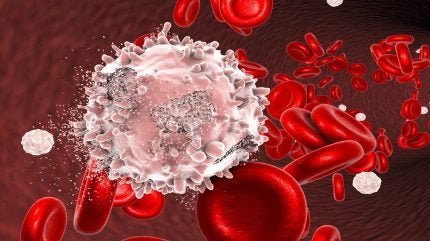

Singapore’s National University Health System (NUHS) has announced that a new cluster of differentiation (CD7) chimeric antigen receptor (CAR)-T cell therapy has demonstrated significant potential in treating patients with relapsed or refractory T-cell acute lymphoblastic leukaemia (T-ALL), offering hope to those who have exhausted standard treatments.
The National University of Singapore’s Yong Loo Lin School of Medicine (NUS Medicine) and the NUHS developed the cell therapy, which targets CD7 on leukaemia cells.

Discover B2B Marketing That Performs
Combine business intelligence and editorial excellence to reach engaged professionals across 36 leading media platforms.
This fratricide-resistant therapy was administered to 17 patients at the NUH in Singapore and at the Ospedale Pediatrico Bambino Gesù in Rome, Italy, from April 2019 to October 2023.
The patients, aged between two and 72 years, had T-ALL that was resistant to chemotherapy or had relapsed post-treatment.
Utilising technology in Professor Dario Campana’s laboratory under the Department of Paediatrics at NUS Medicine, the therapy involved reprogramming patients’ own T cells to express an anti-CD7 CAR, which was then re-infused into the patients.
The re-engineered CAR T-cells attack T-leukaemia cells that present the CD7 protein on their surface.

US Tariffs are shifting - will you react or anticipate?
Don’t let policy changes catch you off guard. Stay proactive with real-time data and expert analysis.
By GlobalDataRemarkably, 16 out of the 17 patients were observed to achieve complete remission within one month, as confirmed by ultra-sensitive flow cytometry tests capable of detecting one leukaemia cell among 10,000 normal cells.
The tests were developed by Ms Elaine Coustan-Smith’s laboratory at NUS Medicine and were instrumental in assessing CD7 expression in leukaemic cells to determine the eligibility of patients and monitor the CAR-T cells post-infusion.
The first patient to receive this treatment has maintained remission for five years without the need for further chemotherapy or a bone marrow transplant.
Despite the high tumour burden and extensive prior treatment of the patients, the therapy was well-tolerated with mild side effects.
The study’s first author, Khoo Teck Puat of the National University Children’s Medical Institute (KTP-NUCMI), NUH, and Paediatric Haematology and Oncology Division consultant Dr Bernice Oh stated: “This CAR-T therapy is a new and promising tool to treat T-ALL patients who have failed conventional treatment.
“These patients had exhausted all potentially curative options, and we are heartened that we could give them another clear chance at cure without severe side effects. We are committed to seeking better cures for patients with complex and treatment-resistant cancers.”
Cell & Gene Therapy coverage on Pharmaceutical Technology is supported by Cytiva.
Editorial content is independently produced and follows the highest standards of journalistic integrity. Topic sponsors are not involved in the creation of editorial content.




